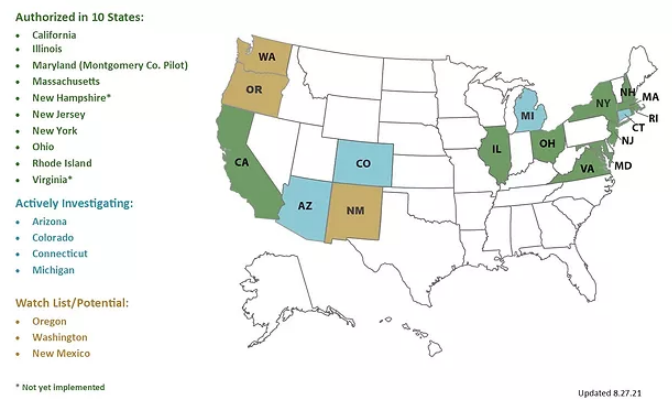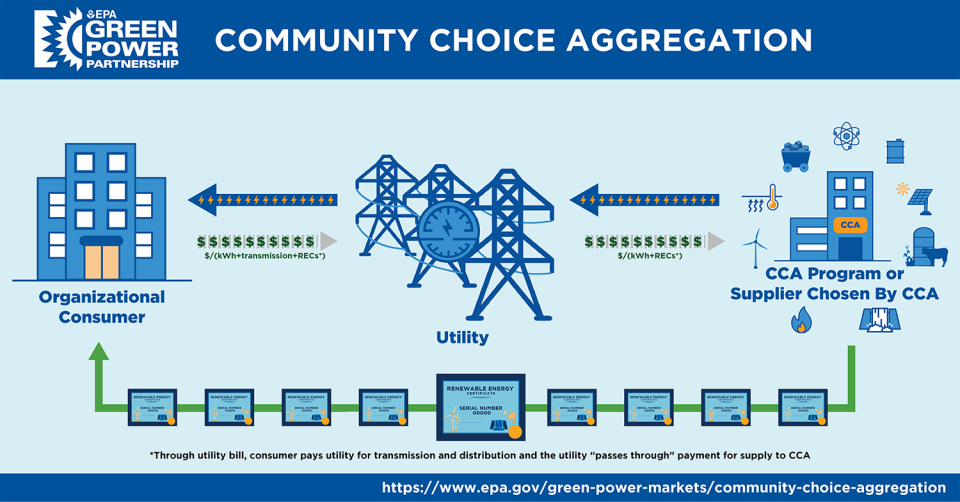Community Choice Aggregation
Explore the sections below to learn more about community choice aggregation (CCA):
- What Is CCA?
- How Do CCAs Work?
- When Was CCA-Enabling Legislation Passed in Various States?
- Advantages and Challenges of CCAs for Local Governments
- Additional Resources
What Is CCA?
CCA—also known as municipal aggregation—programs allow local governments to procure power on behalf of their residents, businesses, and municipal accounts from an alternative supplier while still receiving transmission and distribution service from their existing utility provider. CCAs are an attractive option for communities that want more local control over their electricity sources, more green power than is offered by the default utility, and/or lower electricity prices. By aggregating demand, communities gain leverage to negotiate better rates with competitive suppliers and choose greener power sources.
CCAs are currently authorized in California, Illinois, Maryland, Massachusetts, New Hampshire, New Jersey, New York, Ohio, Rhode Island, and Virginia (Figure 1). In 2022, about 5.7 million customers (pdf) procured about 14.6 billion kWh of electricity through CCAs. Learn more on the status of states' efforts to enact CCA-enabling legislation.

Figure 1. Map of States with Approved CCA Legislation
How Do CCAs Work?
In the 10 states with enabling legislation, a local government must hold public hearings and pass a law authorizing the CCA. Depending on state and local government regulations, all homes, businesses, and municipal sites in that jurisdiction may be eligible to participate in the CCA. Participation in CCAs is always voluntary. Most CCAs have opt-out provisions, meaning when a community begins a program, customers are given advance notice and have the choice to opt out of the CCA program and continue to receive electricity from their current supplier. Customers who do not opt out are automatically enrolled in the program. Although less common, some CCAs have opt-in provisions requiring customers to proactively enroll in the program; these are generally less successful in terms of participation rates. CCAs can also have a tiered structure with a standard option that customers are enrolled in unless they opt out, as well as an opt-in "greener" option at a price premium. These additional opt-in options generally have a higher percentage of green power or are sourced from local renewables.
Prices for electricity under CCAs may be lower than the residential retail price for electricity—sometimes by 15 to 20 percent—because of the collective buying power of entire communities and current market trends. CCA customers continue to receive the same delivery and maintenance services from their local utility, with a single utility bill that reflects the change in supplier. The only changes for customers are the sources and prices of electricity generation.
The below infographic depicts how a typical Community Choice Aggregation works.

When Was CCA-Enabling Legislation Passed in Various States?
| State | Year Established | Alternative Name of Program, Enabling Statute | Notes | Example Renewable Offer |
|---|---|---|---|---|
| Massachusetts | 1997 | Acts 1997, Chapter 164 | Opt-out provision | 100% green power option in CCAs like Lowell |
| Ohio | 1999 | Governmental Energy Aggregation, Senate Bill 3; Senate Bill 221 (2007) (pdf) | Opt-in or opt-out provisions | 100% green power option in CCAs like Cleveland and Cincinnati |
| California | 2002 | Assembly Bill 117 and Senate Bill 790 | Opt-out provision, joint power agencies run programs on behalf of multiple jurisdictions | 33% or 100% green power options in CCAs like in Sonoma County; Marin Clean Energy has 50% and 100% options |
| Rhode Island | 2002 | RI General Law 96-H8124B | Opt-out provision | Some CCAs have standard green power offering of 5 to 10% |
| New Jersey | 2003 | Government Energy Aggregation, Assembly Bill 2165 | Opt-out provision for residential customers; opt-in provision for municipal and commercial customers | No green power options |
| Illinois | 2009 | Municipal Aggregation, House Bill 362 | Opt-out provision for residential and small business utility customers | Many CCAs offer a 100% green power option |
| New York | 2014 | Overview of NY's CCA program | Opt-out provision | 100% green power option in CCAs in Westchester County |
| Virginia | 1999 2004 (opt-out) |
Bill 56-589 | Opt-in or Opt-out provisions | The code allows municipal aggregation since 1999; however, no community choice for resident and businesses programs have been formed. |
| New Hampshire | 2019 | Senate Bill 286 | Opt-out Provision | TBD |
| Maryland | 2021 | House Bill 768 (pdf) | Montgomery County CCE Pilot Program | To launch in December 2023 |
| Washington D.C. | 2000 | Code of the District of Columbia § 34–1515. |
TBD |
See Local Energy Aggregation Network (LEAN) state profiles for sources.
Advantages and Challenges of CCAs for Local Governments
Advantages:
- Potential retail electric rate reduction.
- Enables rapid shift to greener power resources.
- Local control of electricity generation, which can be responsive to local economic and environmental goals.
- Expands consumer choices.
- Can spur local jobs and renewable energy development.
Challenges:
- Implementation is dependent on enabling state legislation.
- Requires successful navigation of various CCA regulations and passing the appropriate ordinances.
- Administrative costs.
- Opt-in versus opt-out clauses can be confusing to consumers.
- Potential for push-back from utilities in traditionally regulated electricity states that would face new competition under CCAs.
Additional Resources
- National Renewable Energy Laboratory (NREL), 2019. Community Choice Aggregation: Challenges, Opportunities, and Impacts on Renewable Energy Markets (pdf)
- LEAN Energy U.S.
- Metropolitan Area Planning Council, 2014. Start a Community Choice Aggregation Program Guide (pdf)
- NREL, 2017. Community Choice Aggregation (CCA) Helping Communities Reach Renewable Energy Goals webpage
- New York State Energy Research and Development Authority. Community Choice Aggregation Toolkit
- NREL, 2023. Status and Trends in the Voluntary Market (2022 data) (pdf).
